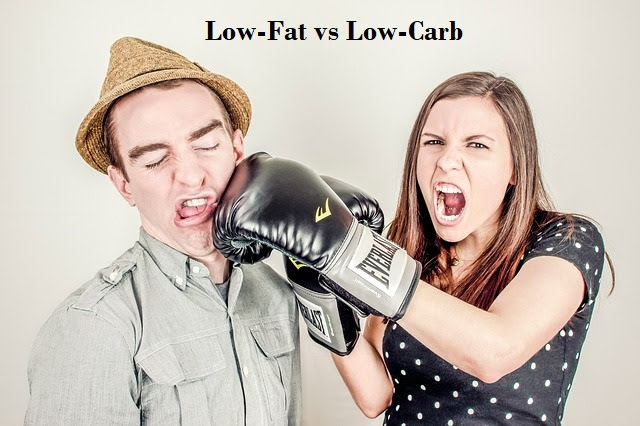Low-carb vs. Low-fat - and the Winner is…..

This is the question that has been asked over and over again as Americans and the rest of the world are becoming more obese by the year.
The answer?According to a new study published in JAMA February 20, 2018, is…neither.
losing 13.2 lbs (6kg) to the low-fat groups 11.7 lbs (5.3kg) – that difference was not enough to reach statistical significance. The study was comprised of about 600 people between the ages of 18-50 with a BMI between 28-40 (normal is 18.5-24.9; overweight 25-29.9; obese 30+) Here is a BMI Calculator if you want to check yours.
The study participants were randomly assigned to either the Healthy Low-fat or the Healthy Low-Carb group. For 12 months they were followed and had regular instructional sessions that taught them about healthy food and lifestyle changes. The study design was quite brilliant in that the end goal was to try and teach the participants how to find a balance in their diet they could sustain as a lifestyle indefinitely.
They called the strategy Limbo-Titrate-Quality. The first step was to “Limbo” or go as low as you can go – asking participants to get their restricted macronutrient (fat or carbs) down to 20 grams per day. As a comparison, the popular ketogenic diet (high fat, moderate protein, low carb) allows for about 25-30 grams of carbs daily. After they sustained this lowered level of carbs or fat for a few weeks the participants could “titrate” those numbers up and see how they fared. The goal was to help them find a level of carbs or fat that they could sustain indefinitely as a lifestyle in order to gain health and lose extra pounds.
“Optimizing diet quality was emphasized by giving both diet groups similar instructions to focus on whole, real foods that were mostly prepared at home when possible, and specifically included as many vegetables as possible every day, however, they liked them – grilled, stir-fried, roasted, etc. They were also encouraged to choose lean grass-fed and pasture-raised animal foods as well as sustainable fish. With a focus on mostly consuming whole, real foods, both groups were likewise instructed to eliminate, as much as possible, processed food products, including those with added sugars, refined white flour products, or trans-fats. Participants were encouraged to prepare as much of their own food as possible, and to optimize the inclusion of fresh, seasonal foods.” (3)

This study did a few things differently that bears some investigation. As a part of the study, they looked at the subjects’ DNA for 3 different single nucleotide polymorphisms (SNPs). One of the genes coded for increased sensitivity to saturated fats and refined carbohydrates, one was associated with type 2 diabetes and fat metabolism and the other with Metabolic syndrome and obesity. They had expected to find that the subjects with certain genetics would respond to one diet more favorably than to the other. For instance, if the subject had the gene that down-regulated fat metabolism they postulated that the subject would fare better on the low-fat diet. They also looked at how the subjects responded to a glucose challenge and guessed that based on that response those who had a higher insulin response to the glucose (carbohydrates) would fare better on the low-carbohydrate diet.
Interestingly, what they did find is that it really didn’t matter about the genetics of the person. What worked for both groups was to improve the quality of the food they were eating and creating a healthy lifestyle including exercise, sleep, and thinking about food differently, which they could maintain.
This is the field of epigenetics which none of the review articles seemed to touch on. Yes, you can have certain predispositions based on your genes BUT in many cases, you can control the expression of these genes by manipulating your environment, including the toxins you are exposed to, and manipulating your nutrition through the use of quality, nutrient-rich, toxin-free foods.
How Health Coaching Was Utilized
This is the first study I’ve seen where they counseled the participants in both groups about food quality. Counseling the Healthy Low-Carb group to eat grass-fed or pastured animal products, “high-quality oils and fats, avocados, hard cheeses, nut butters, and nuts & seeds” and the Healthy Low-Fat group to “choose whole-grain foods (e.g., rather than whole wheat flour products), including steel-cut oats, farro, barley, quinoa, brown rice, and wild rice. Healthy Low-Fat participants were also encouraged to explore and consume a wide range of legumes and beans, fresh fruit, low-fat dairy products, and lean meats.” (3)
In addition to learning how to choose high-quality foods, their classes taught them everything a health coach would delve into including meal planning, how to cook vegetables, organic food, eating out, exercise, behavioral changes, food addiction, mindful eating, sleep, maintaining a healthy weight for life, and my personal favorite – freeing yourself from a “diet mentality”. There were also psycho-social questionnaires touching on the emotional aspects of eating, including food addictions, depression, self-control, stress, and food/eating attitudes. The complete list of the classes/questionnaires can be found here.
Conclusion
In conclusion, what this study shows us is that it’s possible to lose weight and regain your health using different methods. Does low-carb appeal to you? Great! low-fat? Fine! The difference is in adding the HEALTHY word to the front of that moniker. Cut out the refined and processed foods, read your ingredient labels, buy the highest quality food you can afford. Exercise, sleep, de-stress, meditate and exercise. Find the path that works for you. Ditch the diet and gain a lifestyle that works for you to increase your health, slim your waistline and increase your longevity.

References:
- Gardner CD, Trepanowski JF, Del Gobbo LC, Hauser ME, Rigdon J, Ioannidis JPA, Desai M, King AC. Effect of Low-Fat vs Low-Carbohydrate Diet on 12-Month Weight Loss in Overweight Adults and the Association With Genotype Pattern or Insulin SecretionThe DIETFITS Randomized Clinical Trial. JAMA. 2018;319(7):667–679. doi:10.1001/jama.2018.0245
- Gene information from SNPedia
- DIETFITS Study (Diet Intervention Examining The Factors Interacting with Treatment Success) – Study Design and Methods
Other Review Articles of the DIETFITS Trial:
Low-Carb and Low-Fat Diets Battle to a Draw
The Key to Weight Loss Is Diet Quality, Not Quantity, a New Study Finds
Low-fat or low-carb? It’s a draw, study finds
Low-fat vs low-carb? Major study concludes: it doesn’t matter for weight loss






